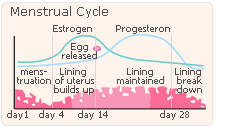
A woman's menstrual cycle is a complex system. Estrogen and progesterone hormones levels have to be at the right amount for a menstrual cycle to be normal and functioning. A woman undergoes certain phases during her cycle including ovulation and the luteal phase. Progesterone hormones levels are low before ovulation and estrogen levels are high before ovulation. It has been hypothesized that anovulation (when ovulation does not take place) may decrease the risk of breast cancer in women. Connecting anovulation and infertility to ovulation may therefore have an effect on the development of breast cancer. To determine the validity of this hypothesis, this study was conducted.
It is believed that women who have fewer ovulation cycles during their lifetime may actually be less at risk for developing breast cancer than women who have normal ovulation cycles. This hypothesis was developed since breast cancer is associated with increased levels of estrogen and connectedly, estrogen levels increase right before ovulation. Progesterone hormones levels are lower before ovulation but higher during the luteal phase of the menstrual cycle.
To prove whether ovulatory disorders decreased the risk of breast cancer and ovulation induction increased the risk of breast cancer, data was collected from the Nurses' Health Study. Participants included 116, 671 female registered nurses from the ages of 25 to 42 years old. Infertility information was assessed every two years from 1989 to 2001. As this study was about fertility, women going through menopause were not included.
Follow-up Information

Follow-up questionnaires were sent to participants of the Nurses' Health Study every other year for the purpose of updating information on risk factors, medical events and infertility status. Specific questions asked whether or not the woman had tried to get pregnant for one year without success. They were also asked whether or not they had taken drugs to induce ovulation over the 2 year window.
Participants were asked birth date, family history of breast cancer, weight at 18 years of age, height during the time the survey started, use of progesterone hormones and age of menopause of their mother. Examiners also took into consideration alcohol intake and use of oral contraceptives.
Results
During the follow-ups, 1,357 women reported of cases of diagnosed breast cancer. Overall results showed that women who had reported infertility due to ovulatory disorder had a significantly lower incident of breast cancer than the women who reported no problems conceiving (during a 12 month period). The lowest incident of breast cancer was among infertile women (because of ovulatory disorder) who had received ovulation - induction therapy.
This study served to prove a definitive relationship between use of ovulatory inducing drugs and a decreased risk in breast cancer. Progesterone hormones played very little a part in this analysis.